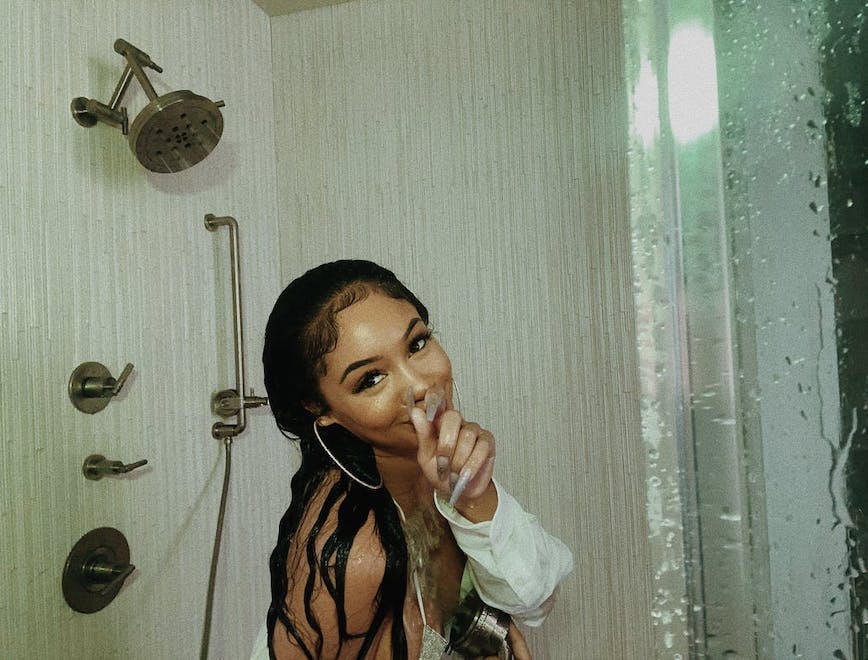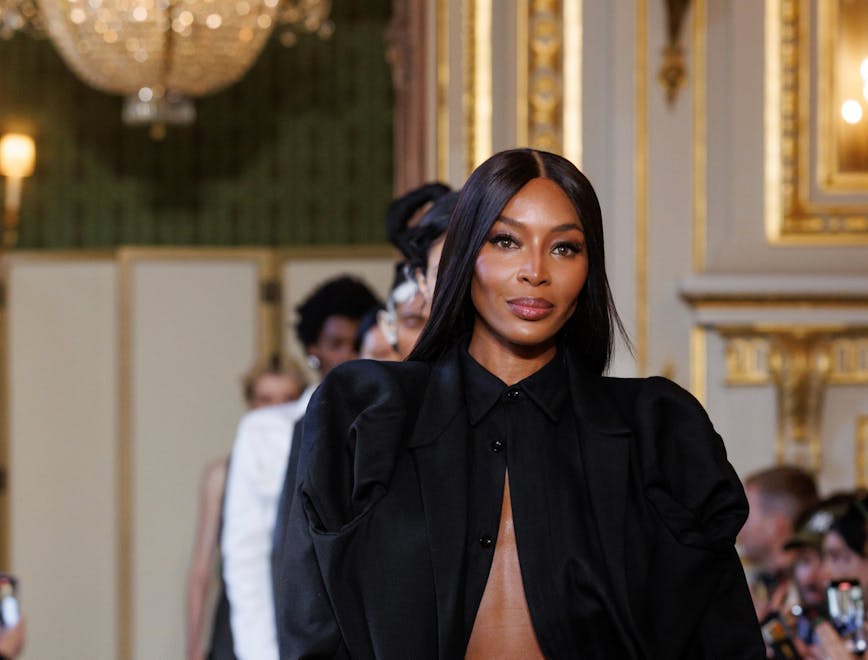Author Leyna Krow On How Jordan Peele And Issa Rae Tapped Her Story For A Feature Film
You wouldn’t know Leyna Krow’s short story, 'Sinkhole', is set in Spokane if you haven’t been there yourself. The quiet city in eastern Washington, where the author has lived for nearly a decade, is actually the backdrop for most of her stories, including those in her 2017 collection I’m Fine, But You Appear to Be Sinking.
“There’s something compelling about this city,” Krow tells us over Zoom. “It’s a little bit of a strange place, but it’s also a little bit of a place that if you didn’t know about it, you wouldn’t know about it.”
Krow’s resident familiarity with Spokane yields tactfully understated landscapes coupled with unusual characters and geographic oddities. In her short story, a vast sinkhole in the backyard mends everything broken that goes through it, and the narrator wonders if her flaws can be fixed by the sinkhole too.
The author's portrayal of Spokane will soon transcend the page as Get Out and Us director Jordan Peele and Insecure actress and creator Issa Rae develop 'Sinkhole' into a feature film for Universal Pictures.
Let’s talk about the process of writing 'Sinkhole'.
It has a weird history. I wrote it for an event here in Spokane; it was a fundraiser for a local arts-based community centre, and the prompt for the event was called Lilac City Fairy Tales. Local authors were invited to write very short, fairytale-esque pieces on the topic of "I Married a Monster", and that’s what 'Sinkhole' was.
It was really just intended for this local fundraising event. It’s set on the street that I live on. It’s just a local Spokane story. One of the event coordinators, Sharma Shields, was also the fiction editor for a literary magazine called Moss. She’s a prolific fiction writer as well, and I highly encourage you to check out her books, because she’s awesome. But she asked me if she could publish 'Sinkhole' in Moss because she really liked it, and I was like, yeah, go for it, that’s great. It was published in 2016, and I didn’t think much about it after that.
And then, in the fall, another one of the editors for Moss called me and said that he was now living in L.A., trying to start a film career for himself, and he wanted to take some of the material that he had published in Moss to different studios and production companies and see if anyone was interested in buying the rights to any of it. He wanted to know if he could do that with 'Sinkhole'. And I said sure, thinking I was never going to hear from him again.
But six months later he popped back up with an agent he’d been working with that actually had interest in 'Sinkhole'. It was all very out-of-left-field for a story that I had no great ambitions for to begin with.
What most excites you about introducing Peele and Rae’s perspectives to the story, and about adapting the story in general?
I learned a lot in conversations with these different studios, directors and producers. One thing that came out of it was the different perspectives that people saw 'Sinkhole' through, the different lenses. A lot of people were drawn to the notion that 'Sinkhole' is central to the experience of being a woman in our society, the expectation of perfection and having to constantly fix oneself. Other people though... Somebody told me they read it as a rejection of capitalism, which was cool. I was like, that’s not what I intended, but I’m going to tell people that from now on.
But what came out of the conversations with Issa Rae's company and with Jordan Peele's Monkeypaw was that some folks were also reading it as a story that could be, in some ways, about race. They were saying, this is the experience not just of women in general, but particularly as the story of a Black woman. The expectation that’s put on Black women in America. I was like, I’m a white person and when I write my characters I envision them as white, and so to think that somebody could read my story and see it in a light I hadn’t intended was really appealing to me. I liked the idea of somebody taking my story and moving it into a space that I can’t access myself. That was a huge draw for me, initially, just from a creative space.
The chance to have something you’ve written produced by Jordan Peele and starring Issa Rae is just the coolest thing ever.
I really sympathised with the narrator for feeling the pressure of certain societal expectations of women. Her husband, Alex, watches her stand at the edge of the sinkhole each night and it seems like he knew she was going to go through it, maybe even wanted her to. What compelled you to represent this sort of male complicity?
Your take is the way that people most often read it. It’s actually made me relook at that relationship, because when I wrote it, I intended it to be much more harmless than that. Her relationship with Alex is a good one, but he’s just so helpless, like he doesn’t know what to do and he can’t engage with her in a way that would stop her from doing it. To see where this desire of hers is coming from.
But in talking to people, a lot of them have the same reaction you do: oh yeah, this dude’s an a******, he’s complicit in this. Even though he’s saying don’t, what he’s really saying is, well, you could be better. I do think that’s a more interesting, and a more likely, reading.
What drew you to the short story as a form?
Most fiction writers start out writing short fiction because it’s the easiest to access. For me, that form just felt natural to stay in. It’s a form that is so satisfying when it’s done well. You can tell a whole story, you can open up a whole world in a short span of time, such that somebody can read it when they’re riding the bus. My husband, he’s a good reader, but he doesn’t read novels very often. He’ll read short stories for that exact reason. He can sit down and read one in its entirety and enjoy it, and then pick up the book again when he wants to.
'End Times' was one of my favourites in the collection.
I wrote that collection over the course of four or five years while I was in graduate school and in the years immediately after. 'End Times' was one of the earlier pieces; I had this idea that I wanted to write a story in two different times. Like someone who is projecting forward to what’s going to happen in the future, and also from her present place.
I’d been trying for a long time to write a story with footnotes in it (which is the nerdiest thing to do), and I was really struggling with it. 'End Times' was my first successful attempt at using footnotes in fiction. Everybody was always like, oh, that’s David Foster Wallace’s territory and nobody else can do it well, but I wanted to try my hand at it.
The story itself, I think of as the most personal story in the collection. I’ve always imagined the narrator as closest to myself, even though her life and family are very different to mine. But I think the way she sees her world, and her relationship to the people she loves, is my own. I don’t have that same connection to other stories in the book.
Who are some of your favorite short story writers?
The folks I look up to in influencing my own work are women writers like Amy Bender, Kelly Link and Stacey Richter. They do really cool things with magical realism and fabulism that show us something poignant and significant about the human experience, but in a way that’s fun, playful and strange. That’s what I want to do, too — if you can tap into something people can empathise with, that’s all that matters in a short story, and you can be as weird as you want to after that.
The worlds of your short stories aren’t entirely rooted in reality. There are elements of the odd or strange within these normal settings, but your characters don’t necessarily regard the phenomena as otherworldly; it’s accepted as a part of their world. I’m curious about how you identify your work genre-wise and your use of these elements.
I call the genre domestic fabulism. I didn’t make that term up — I wish I knew who did. It’s basically stories that are rooted in the real world, often in a domestic setting, a family setting or a household setting, but have a fabulist element to them. Or it’s the reverse; it’s stories that are set in a fabulist setting — outer space, the ocean with a giant octopus — but at their core, still a domestic story about relationships and families.
The idea you’re talking about — the rules of the world are just accepted, people are not thrown off by weirdness — that’s me stealing 100 per cent from Amy Bender. I think she’s the queen of doing that, where the concept of the story, the weird thing, is at the very beginning and it’s just accepted. You’re not going to spend the whole story learning about why the world is that way, because that’s not the fun part. So if we just say, here’s what the strange thing is and everybody accepts it, we can move on.
And that’s what Jordan Peele has always done in his films — he creates worlds that are not made for you to figure out the mechanics of.
The first conversation I ever had with one of the executives at Monkeypaw. He was like, you know, we can go into how the sinkhole works or we can just let people fight about it on Reddit. I thought that was a good way to approach the issue. You can say nothing. You can explain nothing. And people can have fun with that on their own.
Characters are often subject to the forces of the natural world. Tigers live in backyards, a woman conceives in the woods. What can the environment reveal to us about a character? How does a character’s environment affect their behaviour?
I definitely am drawn to the forces of the natural world, and animals in particular. I think because those forces can become characters in their own right, without having dialogue but with a personality. They’re things that can pull and push at your human characters in surprising and significant ways.
And also because in the real world, there are things that pull and push at us in surprising ways, particularly in our current state of being, where humans are becoming increasingly beholden to our changing planet. It’s interesting to think about: when things suddenly change in your environment, whether in a global sense or a local sense or just in your own neighborhood, what is that going to do to the people who experience it?










